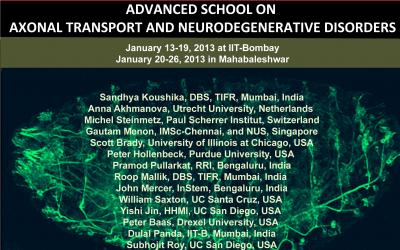Neurodegeneration, a broad symptom which arises out of several different dysfunctions, is prevalent in aging populations, and it mostly affects people after 50 years of age. There are both hereditary and sporadic cases. Alzheimer’s, Parkinson’s, Huntington’s, Charcot Marie Tooth Type 2A (CMT2A), and a variety of different dementia are some examples. Recent research suggests that aberrant intracellular transport and mutations in the motor protein genes can induce such disorders in model organisms and humans. Recent reports also indicate that loss of mitochondrial transport, as well as the slow axonal transport, can induce dementia and neurofibrillary plaques in the brain. In view of these and other related developments, a large body of research has been launched world-wide to elucidate the connection between defective axonal transport and neurodegeneration. This ICTS program, jointly organized by faculties from TIFR, IIT Bombay and UC San Diego, will highlight this new area of research. The program will be organized in two parts:
(i) Advanced School January 13-19, 2013; Venue: IIT Bombay
(ii) Workshop January 20-26, 2013; Venue: The Club Mahabaleshwar
It will be focused on exploring the emergent link between Axonal Transport and Neurodegeneration by well-known and highly acclaimed experts in the field from India and abroad to train and motivate the PhD and postdoctoral students, as well as young faculty. The workshop is organized as a part of the “Mahabaleshwar Seminars on Modern Biology” series and will be concluded with the annual meeting of the Molecular Motors, Transport and Trafficking (M2T2) group
 tifr
tifr  gmail
gmail com
com- Talks
- Other links


